- plymouth@wildlifeanimalcontrol.com
Call 24/7 for a free quote:
508-329-8355
Plymouth Wildlife Animal Control
Professional Wildlife Removal Company Servicing Plymouth, MA
If you have a problem with wildlife in your Plymouth home, your best option is to hire a company that specializes in Massachusetts wildlife removal only. This is a specialty business, and regular pest control companies do not use the proper techniques to solve animal problems. I have spent many years reviewing Massachusetts and Plymouth, and I recommend the following:
Bay State Wildlife
Cell Phone: 508-329-8355
NOTE: If you have a dog or cat problem, call Plymouth County Animal Services: 508-888-1186

Bay State Wildlife specializes primarily in removing animals from attics of homes and buildings - this includes squirrels in attics, raccoons, and rats or mice in homes. Massachusetts also has a documented problem with
bats in buildings, and Bay State Wildlife is specially trained in bat removal. They also perform general wildlife trapping services, such as the capture and removal of skunks or opossums on the
property. Call 508-329-8355 to discuss your critter problem and schedule a same-day or next-day appointment. Click here to learn more about what prices we charge in 2020.
When hiring a company to solve your wild animal problem, you want these features:
- Specializes in wildlife removal, not pest control
- Fully Massachusetts and Plymouth County licensed and insured
- Works 7 days per week (critters don't take weekends off)
- Performs full building inspections: enters and inspects attic
- Performs exclusion repairs, with guarantee against animal re-entry
- Offers cleanup of biohazardous wildlife waste
Bay State Wildlife is a full-service Plymouth wildlife removal company. This is very different from a regular Plymouth pest control company. The pest control companies spray poison to kill insects. This is not at all
similar to wildlife removal. Bay State Wildlife performs a full inspection of the home or property, and determines why the animal(s) are there, and if inside a building, how the animals got inside. All
animals (including rodents) are trapped and removed, or if possible, removed from the building using special exclusion devices. Once the animals are gone, preventative repairs are essential, and
cleanup is sometimes recommended.
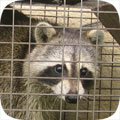 Plymouth wildlife trapping - it's not as simple as it may seem. It's illegal in Massachusetts to trap without a license. Trap type is very important and there are many different types, bait is somewhat relevant, trap placement
is vital, and there are dozens of small things that are very important to know.
Safety is a concern. Then once the animal is trapped, it must be removed and dealt with in the proper manner according to Massachusetts law. We offer Plymouth raccoon removal. Read more about how to get rid of raccoons.
Plymouth wildlife trapping - it's not as simple as it may seem. It's illegal in Massachusetts to trap without a license. Trap type is very important and there are many different types, bait is somewhat relevant, trap placement
is vital, and there are dozens of small things that are very important to know.
Safety is a concern. Then once the animal is trapped, it must be removed and dealt with in the proper manner according to Massachusetts law. We offer Plymouth raccoon removal. Read more about how to get rid of raccoons.
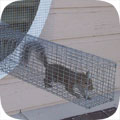 Animals in attics - this is our specialty at Bay State Wildlife. Many types of animals like to live in attics. This includes squirrels, raccoons, rats, mice, bats, birds, and even possums. Critters like to go into attics for a safe place to live
and raise their young. Removing animals from attics is very complex work, partly because of the presence of baby animals. If you need Plymouth squirrel removal, we can remove all the squirrels from your attic, and seal out any future ones. Read more about how to get rid of squirrels.
Animals in attics - this is our specialty at Bay State Wildlife. Many types of animals like to live in attics. This includes squirrels, raccoons, rats, mice, bats, birds, and even possums. Critters like to go into attics for a safe place to live
and raise their young. Removing animals from attics is very complex work, partly because of the presence of baby animals. If you need Plymouth squirrel removal, we can remove all the squirrels from your attic, and seal out any future ones. Read more about how to get rid of squirrels.
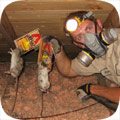 Rodent control must be done in a very specific way. First off, the most important thing is that all the openings that rats and mice can use to enter a house be sealed. Then all the rodents must be physically trapped and removed.
Never, ever use poison! Most Plymouth exterminators will just use this lazy poison technique to kill rodents, and it causes more harm than good - dead stinky rats, and it doesn't solve the problem. Call us for correct Plymouth rat removal. Read more about how to get rid of rats.
Rodent control must be done in a very specific way. First off, the most important thing is that all the openings that rats and mice can use to enter a house be sealed. Then all the rodents must be physically trapped and removed.
Never, ever use poison! Most Plymouth exterminators will just use this lazy poison technique to kill rodents, and it causes more harm than good - dead stinky rats, and it doesn't solve the problem. Call us for correct Plymouth rat removal. Read more about how to get rid of rats.
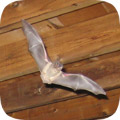 Bat removal is a highly specialized task. Massachusetts is known to have colonizing bats who often live in buildings. Bats love attics. If not removed, the colony can grow to a very large size over the years. The bat droppings are often corrosive and
cause health risks. The same goes for bird droppings on or in buildings. We perform Plymouth pigeon removal and bird control. But our specialty is Plymouth bat removal. We remove 100% of the bat colony and seal the building so that it's totally bat-proof. Read more about how to get rid of bats.
Bat removal is a highly specialized task. Massachusetts is known to have colonizing bats who often live in buildings. Bats love attics. If not removed, the colony can grow to a very large size over the years. The bat droppings are often corrosive and
cause health risks. The same goes for bird droppings on or in buildings. We perform Plymouth pigeon removal and bird control. But our specialty is Plymouth bat removal. We remove 100% of the bat colony and seal the building so that it's totally bat-proof. Read more about how to get rid of bats.
 If you have animals inside a house, no job is complete without proper exclusion repairs. If you simply hire a Plymouth trapper who only removes the critters, then the problem will return. You need to hire a Plymouth wildlife control company that identifies 100% of the animal entry points
into your building, and seals them shut with professional repairs. In addition, in many cases animals have left waste or contamination behind, and you'll want a company that can provide professional cleaning services. Bay State Wildlife does both.
If you have animals inside a house, no job is complete without proper exclusion repairs. If you simply hire a Plymouth trapper who only removes the critters, then the problem will return. You need to hire a Plymouth wildlife control company that identifies 100% of the animal entry points
into your building, and seals them shut with professional repairs. In addition, in many cases animals have left waste or contamination behind, and you'll want a company that can provide professional cleaning services. Bay State Wildlife does both.
The above are just some of the services offered by Bay State Wildlife. We also trap and remove animals that destroy lawns, such as moles, or digging animals. Sometimes animals like opossums will live under buildings, steal pet food, raid garbage cans, etc.
Read about how to get rid of opossums. Skunks commonly live under sheds or decks, and set up a den. We can trap and remove them without them spraying. Read about how to get rid of skunks. Bay State Wildlife
also provides dead animal removal in Plymouth. If you need help with any other wildlife conflict, from a fox, beaver, groundhog, or any other critter, we can solve it. We also do Plymouth snake removal - most of the snakes in Massachusetts are not venomous, but
call us if you want safe removal, or read about how to get rid of snakes in Plymouth. And remember, we are a private business, not Plymouth County Animal Control Services, so if you have a dog or cat problem, call the County at 508-888-1186.
Plymouth County animal services does not handle any wildlife issues.
Bay State Wildlife: 508-329-8355
Plymouth Pricing Info For Year 2020
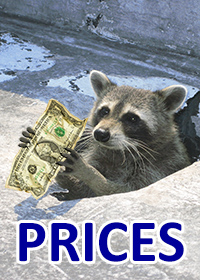 Every wildlife removal situation is different, from the species of animals involved, the location of the animal inside a house or outside, the extent of repairs or cleanup, etc. It's impossible to give one-size-fits-all prices. Examples MIGHT include:
Every wildlife removal situation is different, from the species of animals involved, the location of the animal inside a house or outside, the extent of repairs or cleanup, etc. It's impossible to give one-size-fits-all prices. Examples MIGHT include:
Small Job: For example, a one-stop job to remove an animal in the yard: $100 on up
Medium Job: For example, getting critters out of your house with minor repairs: $300 on up
Large Job: For example, a project involving many service trips and complex work: $500 on up
Give us a phone call now and tell us about your wildlife issue and we will be able to give you a price estimate over the phone. If you're cool with it, we can schedule a same-day or next-day appointment if you like. Our prices are fair, and a good value because we do the job right, the first time.
Plymouth Wildlife Tip #1:
Raccoon removal tips - The best raccoon removal tips come from a professional, and if you're trying to get rid of a raccoon in your building, you might just want to hire someone to help you. But, if you're just looking for tips, here are some that might make life easier. Tip number one: Hire a professional. Yes, it seems redundant to say it again, but most states don't legally allow homeowners to trap and relocate raccoons on their own. These are smart creatures with a likelihood of dangerous illness, so having someone around who knows what they're doing is always helpful. Tip number two: Learn what type of trap is best. There are a number of traps out there; some lethal, some live catch. If you're just looking to get rid of the raccoon, there's no need to kill it. If you know what size cage trap to purchase and know how to set it without alarming the animal, then there's no reason to go the lethal route. Tip number three: Don't put the trap inside the building. Remember that raccoons live in the building, and unlike rats, they don't depend on the interior of the home for food. The raccoon will be in and out after food. Place your trap near the entry hole or attached to it if you can.
Plymouth Wildlife Tip #2:
Baby skunk sounds - Baby skunks make typical sounds when compared to other mammals of the same size. Their noises have been compared to those of a puppy, and a series of yelps, yaps, and squeals make up the bulk of the communication noises. Female skunks usually give birth around the month of May, and their litters are generally small. If you hear the sounds of baby animals beneath your home, you can be certain they are skunks by the pungent odor that will be left by the adult. You have to be careful when trapping and removing an adult that might have babies. If you suspect there is a litter of skunks beneath your porch or shed, contacting a professional can be a good way to handle the situation. The expert will be able to trap the adult and then remove the litter. The best way to take care of this type of situation is to prevent it altogether. Since you know skunks have litter around May, you know you have to get your yard cleaned up before that time. Make sure there is no debris out on the property. Fence in your garden; remove any pet food that might be sitting outside. If you have a deck, porch, or shed with an open space beneath the floor, you need to close that area immediately.
Massachusetts Wildlife Information:
Massachusetts State bird: Black-capped chickadee, wild turkey
State mammal: Right whale
State reptile: Garter snake
State fish: Cod
State insect: 7-spotted ladybug
Massachusetts is one of the smallest states, having only a little more than 10,000 square miles of land. This land was once heavily forested with both pine and hardwood trees, but early agriculture stripped the region almost completely bare of forest. Now, there are only a few groups of old woods, and most of the forested areas are secondary growth. Still, abandon farmland has reverted a little more than half of the state back to forest. The loss of trees chased many species out of Massachusetts, and some native animals, like elk, wolves, cougars, and wolverines, are considered extinct now in the state. The regrowth of trees has lured back in moose and black bear, two large animals that had also been missing since the deforestation.
The young forest vegetation is fantastic for the proliferation of wild turkey, and there are flocks of the birds in most of the state from coastal plain to the edge of the Appalachian Mountains. Turkeys are considered a species of wild game and can be hunted during certain seasons. Incredibly acute hearing makes them difficult to sneak up on, and they can pinpoint a sound from hundreds of meters away. Their eyesight, however, is not particularly good.
Life on the Atlantic coast means dealing with the marine animals that love the oceans. Massachusetts has several large bays that make up its coastline. In these bays, there are numerous seal species, whales, lobster, dolphins, and walruses. The marine animals are rarely nuisances, but seals and walruses have been known to bask near homeowner's docks. The real pests on the coastline are the seagulls. These birds have become bold, and when they aren't hunting in the sand for small crustaceans, they will steal food right out of people's hands.
Anywhere in the state, at any time, there are numerous raccoons looking for places to steal food from or shelters to have a litter of babies. Raccoons usually leave the woods to have their young, and Massachusetts is no exception, especially because it is lacking old, wide, dead trees. If the female raccoon doesn't feel the forest is safe, she'll be looking for an attic. Other home invaders in the state are rats, squirrels, mice, skunks, and opossums. At any time, there might be a woodchuck or a wayward porcupine out in the yard.
You can always call Bay State Wildlife, any time of day, at 508-329-8355, for a price quote for Plymouth wildlife control services. I am confident that this is the best choice amongst wildlife removal companies in Plymouth, MA.





































